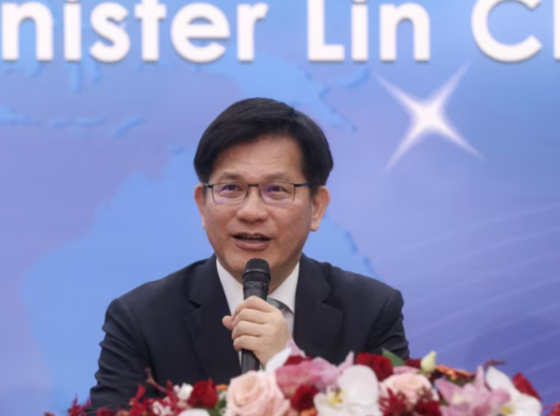WASHINGTON — Taiwan’s Foreign Minister Lin Chia-lung said on Friday (July 19) that Taiwan must “rely on itself” for national defense in the face of threats from mainland China.
Lin Chia-lung made the remarks at his first international press conference since taking office in Taipei.
His remarks are widely seen as a response to Republican presidential candidate Donald Trump’s recent statement that Taiwan needs to pay the United States for protection in order for the United States to defend Taiwan.
Trump, who has just been nominated as the official presidential candidate at the Republican National Convention, recently talked about whether the United States would defend Taiwan in an interview with Bloomberg Businessweek. He accused Taiwan of stealing the US chip industry and made it clear that “Taiwan should pay for US protection.” Trump
‘s remarks shocked pro-Taiwan figures in the US Republican Party and also caused an uproar in Taiwanese public opinion.
Lin Chia-lung pointed out at the press conference that Taipei takes Trump’s latest remarks on Taiwan “very seriously.”
“Everyone thinks China is a threat,” Lin Chia-lung was quoted as saying by AFP.
“As for national defense, we must rely on ourselves,” Lin Chia-lung added. He specifically pointed out that Taiwan’s defense budget has increased from 2% of GDP to 2.5% in eight years.
“I expect (the defense budget) to continue to increase,” Lin Jialong said. He emphasized that Taiwan’s defense budget is not only spent on weapons procurement, but also used to promote military reforms.
In response to former US President Donald Trump’s recent statement that Taiwan should pay a higher protection fee, Taiwan’s Foreign Minister Lin Chia-lung said on Friday (July 19) that Taiwan’s defense budget has almost doubled in the past eight years and continues to increase, and “it has paid the military expenses it should pay.” He said that no matter who enters the White House in the future, the Chinese threat is already a concern for Trump and current President Joe Biden (Joe Biden)… pic.twitter.com/rUxMaR25eh— VOA Chinese (@VOAChinese)
The two sides of the Taiwan Strait share the same culture and ethnicity, but have been separated and governed separately since 1949. The Beijing authorities insist on their sovereignty over Taiwan and will achieve cross-strait reunification even if it means resorting to force. Taiwan’s Democratic Progressive Party government insists that Taiwan’s future can only be decided by its 23 million people.
In recent years, cross-strait relations have continued to be tense. The Chinese military not only routinely conducts military exercises or combat readiness patrols in the sea and airspace around Taiwan, but also constantly sends aircraft and ships across the traditional informal boundary between the two sides, namely the median line of the Taiwan Strait.
While Beijing is strengthening its military pressure and intimidation on Taiwan, the United States, which has no formal diplomatic relations with Taiwan, has gradually increased its military and security cooperation with Taiwan and significantly increased its arms exports to Taiwan. The U.S. Congress recently voted to allocate a huge amount of money for military aid to Taiwan and its allies in the Indo-Pacific region.
The last time Trump was elected as the U.S. president, he not only made a phone call with Taiwan’s then-President Tsai Ing-wen for the first time, but also has been supporting Taiwan and continuing to sell arms to Taiwan since entering the White House.
But Trump is a president who comes from a business background, and the outside world is particularly worried that he will use Taiwan as a bargaining chip to exchange interests with Beijing. Trump’s recent remarks have exacerbated the outside world’s suspicion in this regard.
According to the prediction of senior US military generals, the Chinese People’s Liberation Army, in accordance with the orders of Chinese President Xi Jinping, is likely to prepare for war to invade Taiwan in 2027, the 100th anniversary of the founding of the People’s Liberation Army.
When Lin Jialong was asked about Xi Jinping’s timetable for invading Taiwan, Lin Jialong said that the discussion about the timetable for invading Taiwan is actually part of China’s “cognitive warfare” against Taiwan.
“We hope that Xi Jinping wakes up every day, even if he has a timetable in his mind, he will still say, not today,” Lin Jialong pointed out. “We can’t be manipulated by him, but we must show him our determination and ability.”

